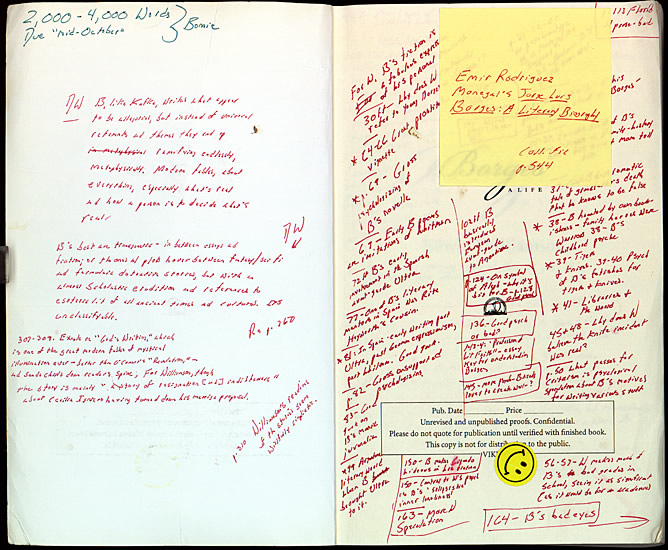
Not long after David Foster Wallace died, his fans found themselves with a new place of pilgrimage: not his tombstone, in the manner of a Jim Morrison or a Kurt Cobain, but his literary archives. You’ll find them at the Harry Ransom Center at the University of Texas at Austin. From their collection, we’ve previously featured Wallace’s fall 1994 English 102 syllabus from when he taught at Illinois State University, his English 183A handout breaking down (in the way that only he could) five common usage mistakes, and the language books contained in his personal library.
Any reader even casually acquainted with Wallace’s novels and essays will immediately sense his deep interest in language. But if you browse through the Ransom Center’s collection of 321 books from the author of Infinite Jest and A Supposedly Fun Thing I’ll Never Do Again’s own shelves (most of them seemingly well-annotated), you’ll find a good deal of evidence about what else interested him. The Awl’s Maria Bustillos did a post on the surprising variety of self-help books found therein. Other represented types of books include:
- Mass-market thrillers like Thomas Harris’ The Silence of the Lambs, Hannibal and Hannibal Rising, and Stephen King’s Carrie
- The novels of his peers like Rick Moody’s The Diviners, Richard Powers’ Gain, Galatea 2.2, and Operation Wandering Soul, Mark Leyner’s Et Tu, Babe and My Cousin, My Gastroenterologist, Jonathan Franzen’s Strong Motion, Cormac McCarthy’s Blood Meridian and Nicholson Baker’s Room Temperature
- Books he wrote about like Bryan Garner’s A Dictionary of Modern American Usage, Edwin Williamson’s Borges: A Life, John Updike’s Toward the End of Time
- Books on his own work like William C. Dowling’s A Reader’s Companion to Infinite Jest
- Books on the midwest from which he came like A Place of Sense: Essays in Search of the Midwest
- Books clearly used as research materials for his final, incomplete, IRS-centric novel The Pale King like Michael J. Graetz’s The U.S. Income Tax: What It Is, How It Got That Way, and Where We Go from Here, William L. Raby’s The Reluctant Taxpayer, and Marty Kaplan’s What the IRS Doesn’t Want You to Know: A CPA Reveals the Tricks of the Trade
- My own favorite novels like Joseph Heller’s Something Happened, Richard Yates’ Revolutionary Road, and Alexander Theroux’s Darconville’s Cat
Have a look, and maybe you too can find a few of your own current or future favorite books. We could all do worse, after all, than to read like David Foster Wallace did, even if it leads us to the occasional volume like Muscle: Confessions of an Unlikely Bodybuilder; Barbed Wire: A Political History; or Jack B. Nimble’s The Construction and Operation of Clandestine Drug Laboratories. And for a weekend activity, we could do worse than comparing Wallace’s personal library to that of Marilyn Monroe, which we featured last year.
Related Content:
David Foster Wallace’s 1994 Syllabus: How to Teach Serious Literature with Lightweight Books
David Foster Wallace’s Love of Language Revealed by the Books in His Personal Library
David Foster Wallace Breaks Down Five Common Word Usage Mistakes in English
David Foster Wallace: The Big, Uncut Interview (2003)
30 Free Essays & Stories by David Foster Wallace on the Web
Colin Marshall writes on cities, language, Asia, and men’s style. He’s at work on a book about Los Angeles, A Los Angeles Primer, and the video series The City in Cinema. Follow him on Twitter at @colinmarshall or on Facebook.


Of course I knew of Mr. Wallace, but have yet to read any of his work. So what did I do? I went out and bought a paperback copy of the 20th anniversary edition of infinite Jest. I have yet to read, it is something I’m working my way up to. I think January would be the perfect time to start it, given I’ll probably be homebound due to the weather here in NYC.
It truly is ashame that we lost him at such a young age. Who knows what wonderful works he would have given the world. Alas, it is not meant to be. Let’s enjoy what he left us and keep his memory alive by reading, commenting and passing on his work.